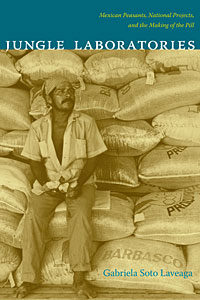 In the 1940s chemists discovered that barbasco, a wild yam indigenous to Mexico, could be used to mass-produce synthetic steroid hormones. Barbasco spurred the development of new drugs, including cortisone and the first viable oral contraceptives, and positioned Mexico as a major player in the global pharmaceutical industry. Yet few people today are aware of Mexico’s role in achieving these advances in modern medicine. In Jungle Laboratories, Gabriela Soto Laveaga reconstructs the story of how rural yam pickers, international pharmaceutical companies, and the Mexican state collaborated and collided over the barbasco. By so doing, she sheds important light on a crucial period in Mexican history and challenges us to reconsider who can produce science.
In the 1940s chemists discovered that barbasco, a wild yam indigenous to Mexico, could be used to mass-produce synthetic steroid hormones. Barbasco spurred the development of new drugs, including cortisone and the first viable oral contraceptives, and positioned Mexico as a major player in the global pharmaceutical industry. Yet few people today are aware of Mexico’s role in achieving these advances in modern medicine. In Jungle Laboratories, Gabriela Soto Laveaga reconstructs the story of how rural yam pickers, international pharmaceutical companies, and the Mexican state collaborated and collided over the barbasco. By so doing, she sheds important light on a crucial period in Mexican history and challenges us to reconsider who can produce science.
Soto Laveaga traces the political, economic, and scientific development of the global barbasco industry from its emergence in the 1940s, through its appropriation by a populist Mexican state in 1970, to its obsolescence in the mid-1990s. She focuses primarily on the rural southern region of Tuxtepec, Oaxaca, where the yam grew most freely and where scientists relied on local, indigenous knowledge to cultivate and harvest the plant. Rural Mexicans, at first unaware of the pharmaceutical and financial value of barbasco, later acquired and deployed scientific knowledge to negotiate with pharmaceutical companies, lobby the Mexican government, and ultimately transform how urban Mexicans perceived them. By illuminating how the yam made its way from the jungles of Mexico, to domestic and foreign scientific laboratories where it was transformed into pills, to the medicine cabinets of millions of women across the globe, Jungle Laboratories urges us to recognize the ways that Mexican peasants attained social and political legitimacy in the twentieth century, and positions Latin America as a major producer of scientific knowledge.
In 2019, a Spanish translation will be available as Laboratorios en La Selva. Translation of Jungle Laboratories (Mexico: Fondo de Cultural Económica, Fall 2019).
